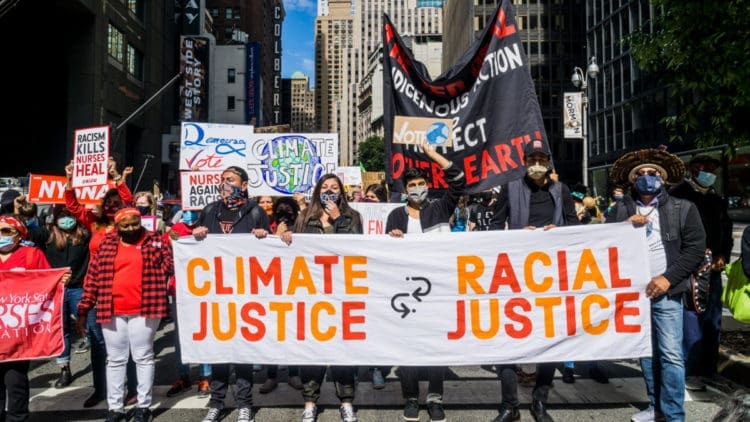Climate change is already here. Severe weather-related events such as more frequent hurricanes, intense droughts, longer wildfire seasons, and devastating floods are evidence of this statement.
However, not all people are experiencing the consequences of the climate crisis equally. All too often, BIPOC (Black, Indigenous, and People of Color) are on the frontlines. Due to systemic injustices, these communities usually lack essential resources to prepare or respond to climate-related events, and outside help is not guaranteed.
BIPOC communities are said to experience climate change “first and worst,” making this global emergency an environmental and social justice issue. The destruction of natural resources devastates local communities as the resources they rely on for survival become ashes. The violence imposed on our planet is so intertwined with violence towards people- so much so that addressing one without recognizing the other would be a grave mistake.
Even though BIPOC have experienced enormous injustices, they have not remained victims of their circumstances. For decades, these groups have spoken up for their health and the health of the planet. They continue to demonstrate the importance of seeing ourselves as part of nature, not apart from it. However, communities of color cannot mitigate the effects of climate change by themselves. The movement to rebuild a world that respects our planet is one we all can, and must, join. And when we amplify their voices, we help them create urgent, everlasting change.
B- Black Americans
Polluting industries, including oil and gas, are more likely to establish facilities near Black neighborhoods because of their lack of political power. Living near toxic chemicals leads to a myriad of health problems such as asthma and cancer. These disparities are a matter of public health. During COVID-19, respiratory conditions put Black Americans at a higher risk for experiencing fatal symptoms, and their lack of quality health care only exacerbated the problem.
Nonetheless, amidst overwhelming heartbreak, Black communities continue to stand up for their rights to a clean environment. The father of environmental justice, Dr. Robert Bullard, is only one example of the many activists who have transformed the environmental movement.
I- Indigenous Peoples
Indigenous communities practice centuries-old traditions that honor nature. Their livelihoods intertwine with the land, water, and other species. Climate change poses a threat to their lifestyles as natural systems become disrupted, extinction rates increase, and landscapes drastically change.
Thankfully, Indigenous wisdom holds the answers to restoring Earth’s ecosystems. When granted protections and sovereignty, they can effectively manage their lands using their sacred methods. By collaborating with Native peoples, we can all be on the path towards global restoration. When we all work together, we develop win-win situations.
POC- People of Color
Other historically marginalized communities, including Latinx immigrants in the United States, live in low tree canopy areas. Urban trees provide a natural cooling system, filter air pollutants, and create wildlife habitat- altogether beautifying the city.9 Nature should be accessible to everyone, not only to the wealthy or privileged. Withholding the benefits trees, clean water, and clean air provide to low-income communities denies them the right to a healthy environment.
People of Color have championed the environmental justice movement since the beginning. The unfair circumstances forced upon them have become a breeding ground for invaluable insight.
To address gaping inequalities that will only grow bigger if unaddressed, we need climate justice. Climate justice is the recognition of the immorality interconnected with climate change. The climate crisis, racial injustices, gender inequality, wage gaps, and more are all connected. Acknowledging the intersectionality of the epidemics of our time leads to powerful collaborations. Through this holistic lens, we can work together to build solutions that work for everyone. When we address one of these issues, we address all of them.
To confront the climate crisis, we must first remember its root cause: human activities; more specifically, wasteful activities carried out by privileged groups. Excessive drilling for fossil fuels and the addictive culture of overconsumption combined to form narrow-minded systems. While a few people continue to benefit from these systems, the well-being of most people, other species, and the planet stay threatened.
Now that more governmental bodies are developing policies related to climate change, our job is to ensure that every community has a role in the decision-making process. When rebuilding our world, we cannot utilize the same mindset that led to the climate crisis in the first place. Either we move forward together, or we all remain standing still- under this pile of pollution.
The choice is ours. What we do today determines the future we will experience tomorrow. Without racial or social justice, there is no climate justice.
By Tania Roa
This article was originally published in The Climate Issue, Issue 5. The original version can be found here.
Featured photo by Capital Media

